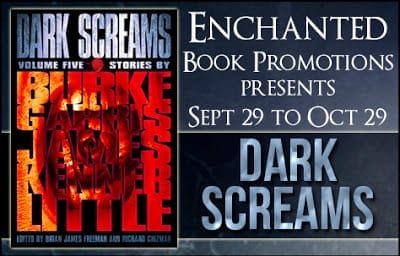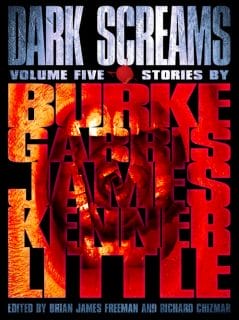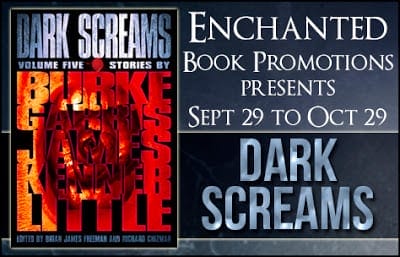


Little, and Mick Garris
Horror / Paranormal Fantasy / Paranormal Romance
Little pry open a sarcophagus of horror and dread in Dark Screams:
Volume Five, from Brian James Freeman and Richard Chizmar of the
esteemed Cemetery Dance Publications.
slasher flick. But the price of admission is higher than this has-been
filmmaker ever could have imagined.
later, a broken heart sends him to New Orleans . . . but it’s fate that leads
him to Madame Darkling’s Voodoo Emporium.
marriage, her silence has tortured her husband ever since. Now he will seek out
what he has lost—or be driven mad by remorse.
willing to do anything to protect them both—especially after hearing strange
noises coming from his garage.
property she’s trying to sell—and finds herself strangely reluctant to leave.

From “Everything You’ve Always Wanted” by Mike Garris”
It had been a long time since I’d flown first class, and I must admit that I’d missed it. But here I was, winging across a vast, arid, flyover America, bound for the bustling metropolis that was Indianapolis, wondering which came first in the English lexicon: metropolis or Indianapolis. Surely the former. I’d have to remember to Google it when I was back within Internet range.
I had never been to Indianapolis before, and for that matter, don’t think I know anyone who has. Is there a reason to visit there? Other than as a special guest at the annual MonsterThon convention, of course, which was the crown of thorns I wore this particular moribund weekend. Leaving L.A. before the landlord came sniffing around for his filthy lucre was always a good idea, and to have travel and accommodations paid for—and in first class, no less!—by a third party put the emphasis on the party.
Some time ago, I had made a little independent film, one that maybe even you have heard of (let me virtually buff my fingernails on my shirt and let them gleam in the sin of pride). Taxed was one of those exceedingly rare little horror thrillers that could have happened only before the end of the twentieth century: It cost about $400,000, was filmed with an unknown cast in Florida, got picked up and released on five hundred screens by New Century Millennial, and somehow earned a box-office gross of more than $12 million (well, that’s $12 million that New Century Millennial would admit to, so I’d bet you could add at least fifty percent and be closer to the actual gross).
Taxed was crude, I’ll admit it, but that worked for the story, which was a hillbilly horror tale of rural cannibals who excelled at human taxidermy, and it owed huge debts to Tobe Hooper, Alfred Hitchcock, and Wes Craven (the movie, not the cannibals, though I suppose they did, too). But I think it was the Shakespeare references that I had injected—and expounded on in every interview—that gave it an air of respectability in the mainstream press.
Of course, the horror genre, particularly at that time, has always been a gutter in the eyes of the tastemakers in America. But if you can bandy about Lady Macbeth and Rosencrantz and Guildenstern as well as Dalí and Gaudí, and at least have a passing knowledge of a cultural past, the pretenders of critical mass will take in your bullshit and look for Deeper Meaning and embrace your little cinematic masterpiece and give it attention.
The Taxed reviews weren’t all good, but the fact that it was taken seriously enough to review at all was quite an accomplishment, so our audience went beyond the bloodthirsty gorehound Fangoria subscribers and the multiplex subbasement and into the arthouse sensibility as well. We had that rare crossover horror hit. Well, if you can call twelve million bucks a hit, and New Century Millennial did, repeatedly.
It did even better on video.





